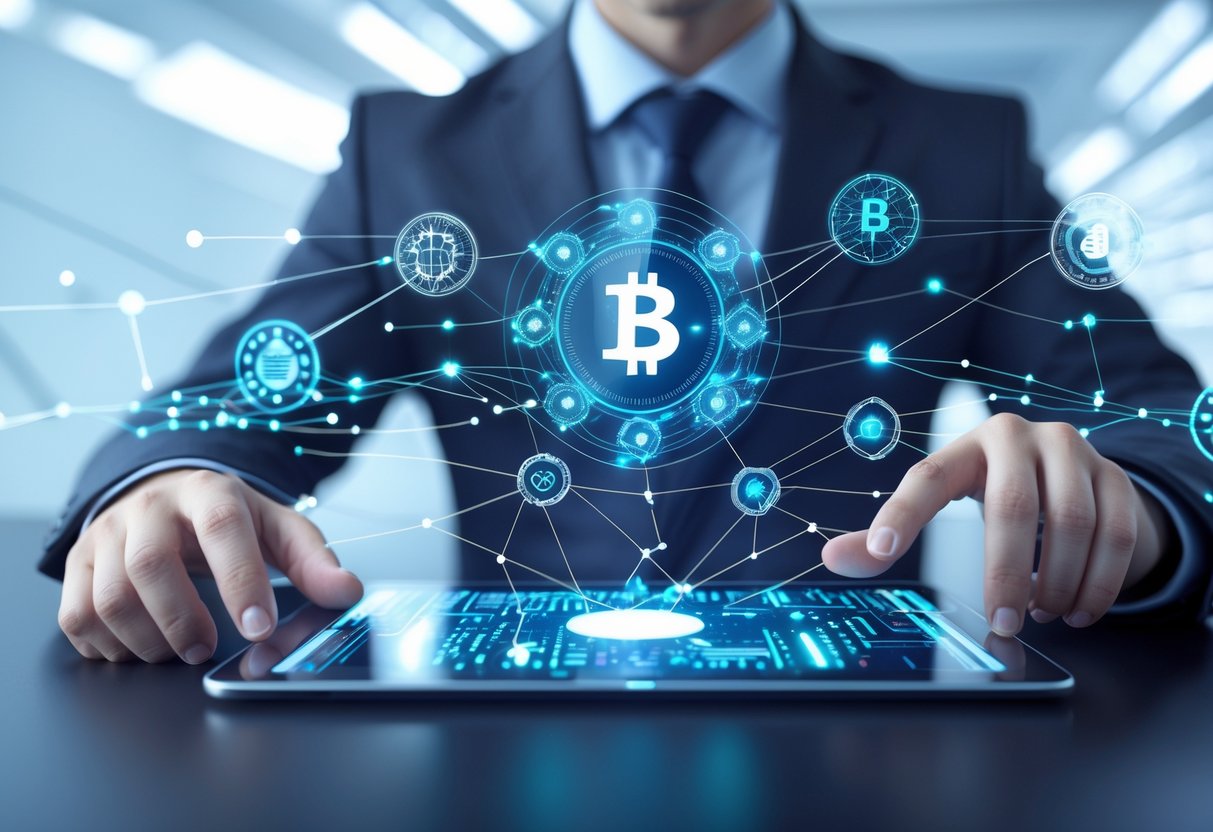
AI smart contracts are transforming the blockchain world by merging artificial intelligence with self-executing agreements. Unlike traditional smart contracts that follow fixed rules, these AI-powered versions can learn, adapt, and make decisions based on new data. AI smart contracts reduce the need for middlemen while providing more flexible, intelligent solutions for complex business problems.

See Rewards Linked to This Topic—Follow Steps to Get:
Great news—exclusive perks are just a few steps away! Follow these simple actions to unlock bonuses linked to this topic!
How It Works (Fast & Easy!)
1️⃣ Check Your Rewards in Seconds
→ Click Here to See How Much You Qualify For (No commitment!)
First-time withdraw can unlock 7K+ USD.
2️⃣ Connect Your Wallet
Use any mobile or desktop wallet (MetaMask, Trust Wallet, etc.)—approved in seconds!
3️⃣ Cash in Your Pocket in 15 Minutes!
Get your funds fast—no credit checks, no waiting.
Why This is a Game-Changer 💎
✔ Each month there is a free offer reward for all users.
🔥 Limited-Time Offer – Claim Your $7K+ Now!
👉 Get Instant Access Here
No hidden fees. No credit checks. Just fast cash against your crypto! – and this is not a financial advice.
These innovative contracts operate across multiple blockchains when paired with cross-chain technology, making them highly versatile tools. They’re already making waves in several industries including decentralized finance, supply chain management, healthcare, and insurance. For example, in insurance, AI smart contracts can analyze risk profiles and automatically adjust premiums to reduce fraud.
The combination of blockchain’s security with AI’s learning capabilities creates agreements that evolve over time. Rather than simply executing predetermined actions, AI smart contracts can analyze patterns, respond to changing conditions, and optimize outcomes without human intervention. This technology represents the next evolutionary step in how we create and enforce digital agreements.
Understanding AI Smart Contracts

AI smart contracts represent a revolutionary blend of artificial intelligence and blockchain technology. These advanced digital agreements are transforming how businesses automate processes and execute transactions with greater intelligence and adaptability.
Core Concepts and Definitions
AI smart contracts are self-executing digital agreements that combine blockchain security with artificial intelligence capabilities. Unlike traditional smart contracts that follow simple if-then logic, AI-powered smart contracts can analyze data, learn from patterns, and make intelligent decisions based on complex conditions.
These innovative computer programs operate on blockchain networks, ensuring transparency and immutability while adding a layer of computational intelligence. The core function remains the same – automating agreement execution without intermediaries – but with enhanced decision-making abilities.
AI smart contracts can process natural language, adapt to changing conditions, and optimize terms in real-time. This makes them particularly valuable for complex agreements where conditions may evolve or require interpretation beyond simple binary triggers.
How AI Integrates With Blockchain Technology
Blockchain technology provides the secure, decentralized foundation upon which AI smart contracts operate. The integration happens in several key ways. First, AI algorithms can be embedded directly within the contract code, allowing for on-chain intelligence.
Alternatively, AI systems can operate off-chain but connect to the contract through secure oracles that feed external data. This hybrid approach balances computational requirements with blockchain’s security benefits.
The fusion creates contracts that can:
- Process and analyze large datasets before execution
- Adapt to changing market conditions autonomously
- Make probability-based decisions rather than simple yes/no triggers
- Learn from previous contract executions to improve future performance
This powerful combination maintains blockchain’s trustless verification while expanding smart contracts’ capabilities beyond predetermined scenarios.
Traditional vs. AI-Powered Smart Contracts
Traditional smart contracts operate on rigid, predetermined rules. If a specific condition is met, a specific action executes – no interpretation or flexibility exists. This works well for simple agreements but falls short with complex real-world scenarios.
AI-powered smart contracts, by contrast, can:
- Interpret conditions – Understanding intent rather than just exact parameters
- Adapt to circumstances – Modifying execution based on evolving situations
- Optimize outcomes – Finding the best possible execution path among many options
For example, in DeFi applications, traditional contracts might reject a loan based on rigid criteria. AI smart contracts can assess risk more holistically, potentially approving qualified borrowers who might otherwise be rejected.
These enhanced capabilities make AI smart contracts especially valuable in supply chain management, insurance, and other industries where conditions frequently change and nuanced decision-making improves outcomes.
Benefits and Challenges of AI Smart Contracts

AI smart contracts blend artificial intelligence with blockchain technology to create automated agreements that can adapt and make decisions. These innovations offer significant advantages while presenting unique challenges for developers and users alike.
Enhanced Automation and Efficiency
AI smart contracts dramatically improve efficiency by automating complex processes that previously required human intervention. Unlike traditional contracts, these intelligent agreements can analyze data in real-time and execute actions based on predefined conditions without manual oversight.
For businesses, this means faster transaction times and reduced operational costs. A supply chain using AI smart contracts can automatically verify shipment conditions, trigger payments when goods arrive safely, and even reroute deliveries when problems occur.
The automated nature of these contracts eliminates human error in routine tasks. Studies show that companies implementing AI-driven contracts reduce processing time by up to 80% compared to manual methods.
These systems can handle thousands of transactions simultaneously, making them ideal for high-volume industries like finance and logistics.
Security and Fraud Prevention
Enhanced security is a major benefit of AI smart contracts. These systems use advanced algorithms to detect unusual patterns that might indicate fraudulent activity before transactions complete.
The immutability of blockchain combined with AI’s analytical capabilities creates a robust security framework. Once recorded, contract data cannot be altered, creating a permanent audit trail that prevents tampering.
AI can continuously monitor contract execution, flagging potential security issues in real-time. This proactive approach helps prevent attacks before they cause damage.
Risk mitigation improves as these systems learn from past transactions to identify new security threats. For example:
- Automatic detection of suspicious transaction patterns
- Real-time validation of digital signatures
- Continuous monitoring for unauthorized access attempts
- Self-updating security protocols based on emerging threats
Transparency and Data Privacy
AI smart contracts offer unprecedented transparency while maintaining essential data privacy. The decentralized nature of these systems means all transactions are visible to network participants, creating trust among parties who may not know each other.
Transactions execute exactly as programmed without the possibility of manipulation. This transparency helps reduce disputes as all parties can verify contract terms and execution.
However, balancing transparency with data privacy presents challenges. AI smart contracts must protect sensitive information while maintaining sufficient visibility for verification purposes.
Modern implementations use advanced cryptographic techniques to create selective transparency. Critical information remains accessible only to authorized parties while the broader contract status remains visible to all participants.
These systems can also automatically implement regulatory compliance requirements across different jurisdictions, reducing legal risks.
Complexity and Interoperability
The complexity of AI smart contracts presents significant challenges for widespread adoption. Developing these systems requires specialized knowledge in both blockchain technology and artificial intelligence – skills that remain in short supply.
Interoperability between different blockchain platforms remains difficult. AI smart contracts created for Ethereum may not work on other networks without substantial modification, creating potential silos of information.
Scalability concerns persist as AI components require significant computing resources. This can lead to slower performance during high-demand periods.
Testing and debugging these complex systems presents unique challenges:
- Edge cases may be difficult to anticipate
- AI decision-making processes can be challenging to audit
- Fixing bugs after deployment is complicated by blockchain immutability
- Integration with existing business systems requires careful planning
Despite these challenges, development tools continue to improve, gradually making AI smart contracts more accessible to mainstream businesses.
Key Applications of AI Smart Contracts

AI smart contracts are transforming several industries by improving efficiency, security, and automation. These innovative tools combine artificial intelligence with blockchain technology to create self-executing agreements that adapt to changing conditions and make intelligent decisions.
Financial Services and DeFi
AI smart contracts are revolutionizing decentralized finance (DeFi) through intelligent automation. These contracts enable real-time loan approvals using AI-driven risk assessment that evaluates creditworthiness without human intervention.
In trading platforms, AI smart contracts execute transactions based on market conditions, helping investors optimize their portfolios. They can analyze market trends and automatically adjust strategies to maximize returns.
DeFi applications benefit from enhanced security as AI can detect unusual patterns that might indicate fraud or attacks. This protection is crucial in an industry where transactions are irreversible.
Financial institutions use these contracts to streamline compliance processes. The AI can verify identities, check against sanctions lists, and ensure all regulatory requirements are met automatically.
Insurance and Claims Processing
Insurance claims processing has been transformed by AI smart contracts that verify and settle claims without human review. When a claim is submitted, the AI analyzes the information against policy terms and available data.
The technology reduces fraud by cross-referencing claims with external data sources like weather reports or traffic records. Suspicious patterns trigger additional verification steps while legitimate claims proceed automatically.
Policy management becomes more dynamic with AI contracts that can adjust coverage based on changing risk factors. For example, a driver’s insurance might automatically adjust rates based on driving behavior.
Claims can be settled within minutes rather than days or weeks. After verification, payment can be released immediately, improving customer satisfaction and reducing administrative costs for insurance companies.
Real Estate and Property Transactions
Real estate transactions benefit from AI smart contracts through streamlined property transfers and reduced paperwork. The technology verifies property details, ownership history, and legal status automatically.
Property transactions become more secure as AI contracts can detect inconsistencies in documentation or potential fraud attempts. This protection benefits both buyers and sellers in high-value deals.
The closing process speeds up dramatically when AI handles document verification and fund transfers. What once took weeks can now happen in days or even hours.
Rental agreements can use AI contracts to manage security deposits, maintenance requests, and lease renewals. The system automatically processes routine transactions while flagging unusual situations for human review.
Supply Chain Management and Healthcare
Supply chain management gains transparency through AI smart contracts that track products from manufacturing to delivery. These systems can verify product authenticity and ensure quality standards are maintained.
When shipments change hands, AI contracts automatically update ownership records and trigger payments. This eliminates disputes about delivery timing or product condition.
Healthcare organizations use AI smart contracts to manage patient records securely. The technology controls access to sensitive information while maintaining a complete audit trail of who accessed what data.
Medical supply chains benefit from similar tracking capabilities, ensuring critical medications and equipment are authentic and properly handled. The AI can alert stakeholders to potential issues like temperature excursions during shipping that might compromise product quality.
Technology and Development of AI Smart Contracts
AI smart contracts combine blockchain technology with artificial intelligence to create self-executing agreements that can adapt, learn, and make decisions. These innovative tools are reshaping how businesses handle transactions and agreements across industries like finance, supply chain, and legal services.
Natural Language Processing and Machine Learning
AI smart contracts leverage Natural Language Processing (NLP) to transform traditional legal language into code. This technology allows contracts to understand, interpret, and process human language with remarkable accuracy.
Machine learning algorithms enhance these contracts by enabling them to learn from past transactions and improve over time. They can analyze patterns in data to make predictions about future conditions that might affect contract execution.
Predictive analytics plays a crucial role by helping AI smart contracts anticipate market changes or potential risks. For example, in DeFi applications, these tools can assess loan risks in real-time based on constantly updating financial data.
Data analysis capabilities allow AI smart contracts to process large volumes of information quickly, making them more efficient than traditional systems for complex agreements.
Smart Contract Development Tools
The development of AI smart contracts relies on specialized programming languages and platforms. Solidity remains the dominant language for Ethereum-based smart contracts, but new AI-enhanced alternatives are emerging.
Ethereum provides a robust foundation for AI smart contract deployment, while platforms like Cardano offer alternative environments with different technical advantages for AI integration.
Development tools now include:
- AI-assisted code generators that reduce programming errors
- Testing frameworks that simulate various conditions
- Debugging tools with machine learning capabilities
- Integration platforms that connect contracts with external data sources
These tools help developers create more secure and functional AI smart contracts by automating complex coding processes and identifying vulnerabilities before deployment.
Governance, Ethics, and Regulatory Compliance
AI smart contracts face important governance and ethical considerations as they gain adoption. Their autonomous nature raises questions about accountability when decisions affect financial transactions or legal agreements.
Regulatory compliance remains a key challenge as laws struggle to keep pace with technological innovation. Smart contracts must adhere to existing regulations while operating in a largely unregulated space.
Ethical concerns include:
- Transparency in decision-making algorithms
- Fairness in automated judgments
- Privacy of data used in contract execution
- Accountability for incorrect outcomes
The legal industry is adapting by developing new frameworks for AI contract governance. Meanwhile, education about these technologies is crucial for users to understand both benefits and limitations.
Organizations implementing AI smart contracts need clear governance structures to monitor performance and address potential biases in underlying algorithms.
Frequently Asked Questions
AI smart contracts combine the reliability of blockchain technology with the adaptability of artificial intelligence. These integrations solve common issues in traditional contracts while opening new possibilities for automation and decision-making capabilities.
What are the primary advantages of integrating AI with smart contracts?
AI smart contracts offer several significant advantages over traditional smart contracts. They can process and analyze complex data sets in real-time, allowing for more sophisticated decision-making.
These contracts can adapt to changing conditions without manual intervention. This flexibility makes them ideal for dynamic business environments where conditions frequently change.
Cost reduction is another key benefit, as AI automation eliminates expensive intermediaries and reduces human error. Many organizations report operational cost savings of 25-40% after implementation.
How can artificial intelligence enhance the performance and security of smart contracts?
Artificial intelligence significantly improves smart contract security through advanced threat detection. AI systems can identify potential vulnerabilities and unusual patterns that might indicate an attack.
Performance optimization happens automatically as AI analyzes execution patterns. The system learns from each transaction, gradually improving efficiency and reducing gas costs on blockchain networks.
AI also enables predictive maintenance of contract systems. It can forecast potential issues before they cause problems, ensuring smoother operations and fewer disruptions.
What are the unique capabilities of AI-driven smart contracts as opposed to traditional smart contracts?
AI-driven smart contracts can handle ambiguity in ways traditional smart contracts cannot. Where traditional contracts require precise conditions, AI contracts can interpret context and make reasonable judgments.
Natural language processing allows these contracts to understand and execute based on human language inputs. This makes them more accessible to non-technical users.
These contracts also feature self-improvement capabilities. They learn from each execution and transaction, becoming more efficient and accurate over time without requiring manual updates.
How do decentralized AI systems impact the development and execution of smart contracts?
Decentralized AI removes single points of failure in smart contract systems. This distribution of intelligence across multiple nodes increases reliability and resistance to attacks.
These systems enable community governance of contract parameters. Stakeholders can participate in decision-making processes that guide how the AI operates within contractual frameworks.
Cross-chain compatibility becomes easier with decentralized AI systems. They can bridge different blockchain environments, allowing contracts to operate seamlessly across multiple platforms.
What are the challenges and considerations when implementing AI technologies within smart contracts?
Data privacy remains a significant challenge for AI smart contracts. Balancing the need for information with privacy requirements requires careful consideration of data handling practices.
Computational resource requirements can be substantial. AI processing often demands more resources than traditional contracts, potentially leading to higher transaction costs.
Regulatory compliance presents another hurdle. As regulations around AI and blockchain evolve, contracts must be designed with adaptability to changing legal frameworks.
Can you explain how on-chain artificial intelligence operates within the infrastructure of smart contracts?
On-chain AI functions directly within the blockchain environment. This integration ensures that all AI decisions are recorded immutably and remain transparent to all participants.
Execution happens through specialized computational oracles that provide AI processing capabilities. These oracles connect to the main blockchain while handling the intensive calculations required.
Smart contracts utilizing on-chain AI benefit from consensus validation. Each AI-driven decision passes through the same verification process as other blockchain transactions, ensuring reliability and trustworthiness.
Leave a Reply